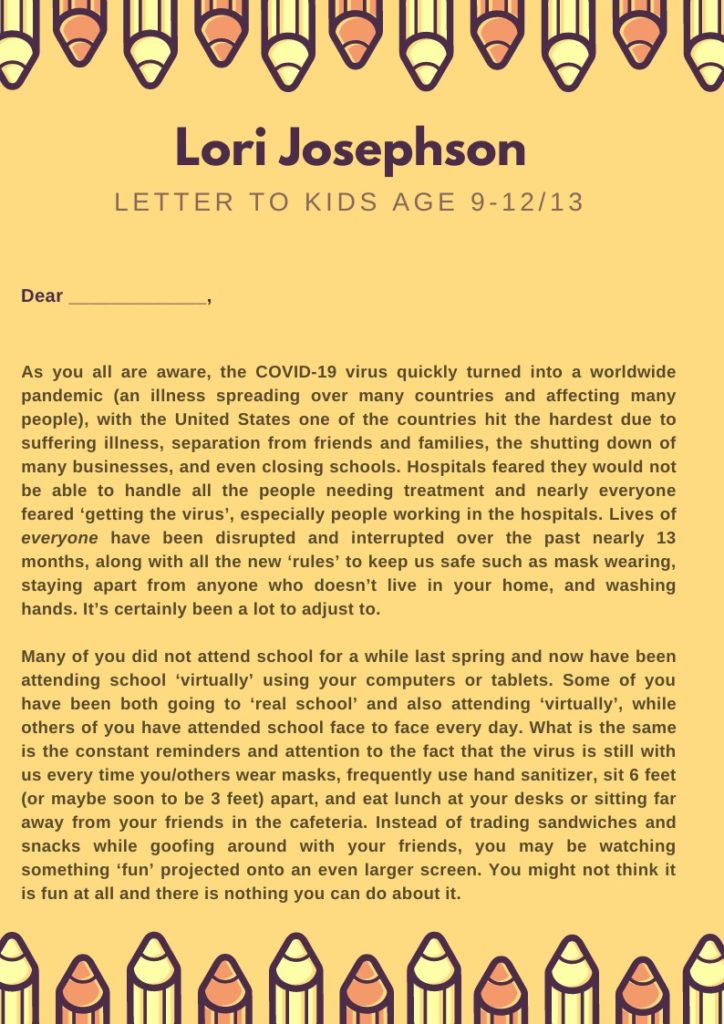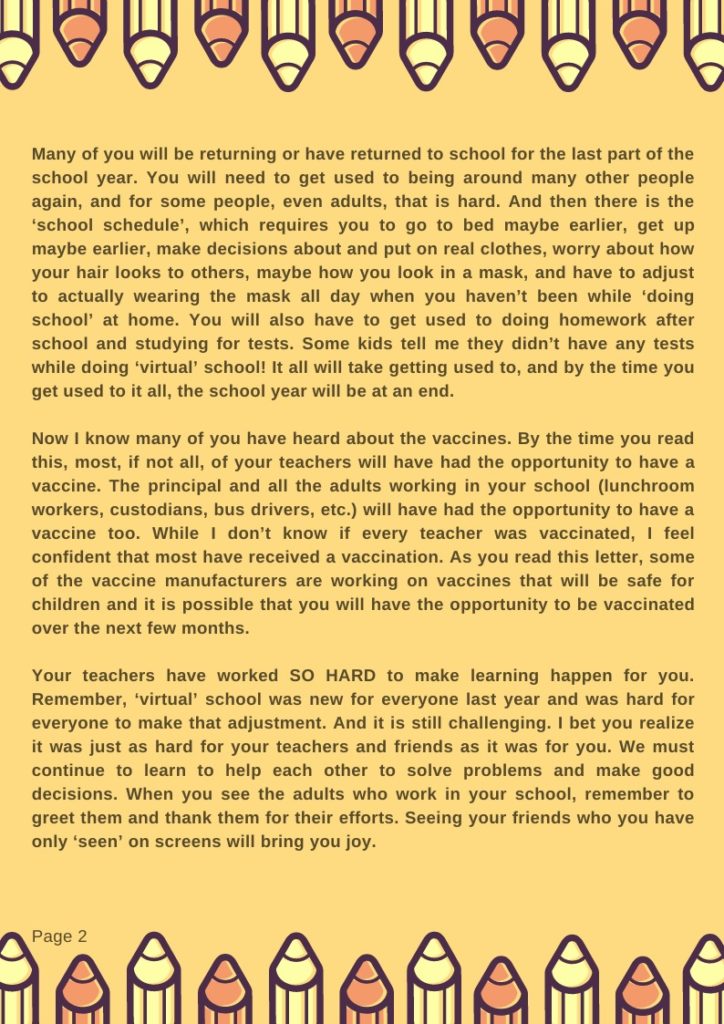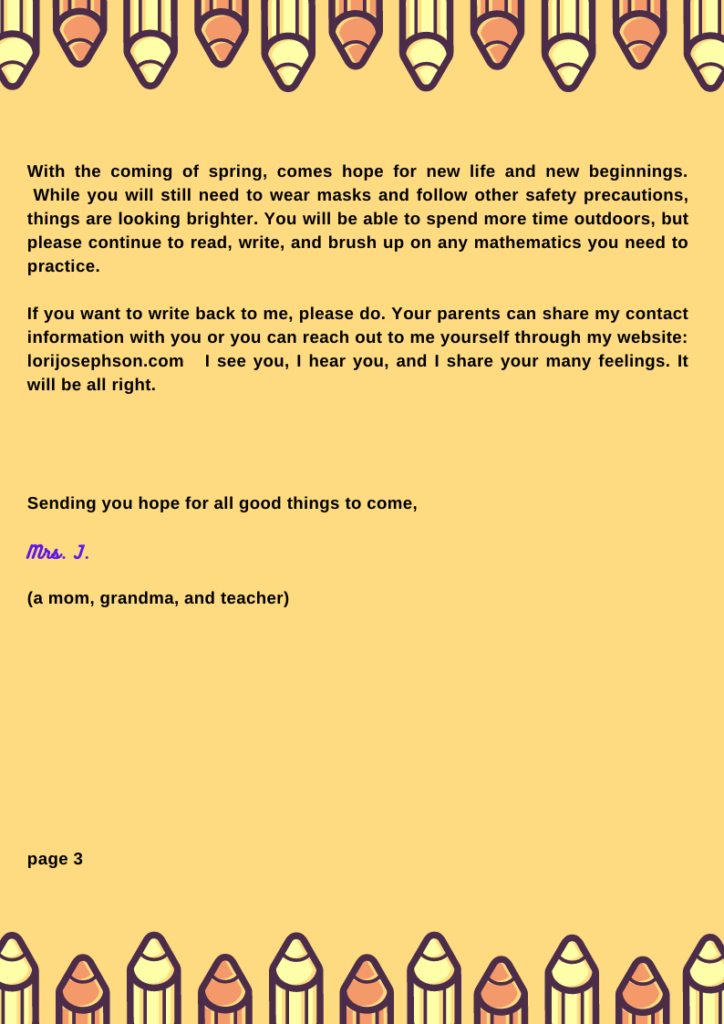Last week, I wrote a letter to be read to children (ages 5-about 8) with the intent of validating their true feelings about the return to school after a bit more than a year of either remote and/or hybrid schooling, or for some, brick and mortar schooling amidst the fear and confusion of the pandemic, as well as all the challenging safety measures put in place to allow for face to face learning.
One of my friends read last week’s letter to her grandson. He was very interested as to why someone he did not know wrote a letter to him…in addition, he kept asking my friend, “How does she know how I am feeling? She doesn’t even know me, but she is right!”
This week, I am targeting children ages 9-12/13 (the tweens) in my letter. These older elementary and middle school students have a whole host of different issues to face in terms of either attending school and/or going back to ‘real’ school. This age group of children are beginning to develop the emotional skills needed to deal with the stress and changes wreaking havoc on all of us since March 2020. For example, this age group is learning to express emotions, and deal appropriately with the difficult emotions of fear and rejection. This age group increasingly seeks independence in terms of doing homework and setting goals. Children in this age group increasingly spend time with friends more independently and value what their friends have to say, as well as seek advice and assistance from friends. Problem solving, decision making, and looking at the world from others’ perspectives typically are front and center, with parents sometimes taking second place!!! By the time children enter the teenage years, they are on their way to developing their values and morals.
Again, we are going back and forth in terms of how much screen time is the ‘right amount’ for this age group of children. What about cell phones? For many children of this age, socialization has consisted of using screens. Is that wrong? Likely not, given the circumstances. This age group differs from the primary school age in so many ways: far more awareness of the world, perspective taking, independence, questioning. Are your children questioning you and questioning what’s happening in their small and big world these days? They are normal and I’d encourage you to encourage your children to continue questioning!!
As I wrote last week, this age group of children continues to watch us closely. Michelle Obama is spot on when she said, “With every word we utter, with every action we take, we know our kids are watching us. We as parents are their most important role models.”
The average attention span for children is typically two to three minutes per year of age, meaning roughly 20-36 minutes for children ages 9-12/13. While some children receive lessons within this time frame, others are required to attend to a screen many more minutes, so if your children are experiencing ‘Zoom Fatigue’, I’d likely believe them. This age group also differs in terms of the sheer amount of information they are required to take in and learn, the need to work independently, and (hopefully), the quantity of assignments requiring completion.
With the increasing rollout of vaccination to more of the population, hope for a return to a new version of ‘normal’ continues to be on the horizon with the hope that families can spend more time with others, including extended family they may not have been able to see and hug.

Today, I thought I’d write a letter (watch for my next blog post for the next letter for teens ages 13+) for you to share with the children ages 9-12/13 with whom you interact. Would love it if you shared both the letter and your/your children’s thoughts with me.
In case you missed last week’s blog post, The Learning Disabilities Association of America put out a survey just last week entitled K-12 Parents: How Has Covid Affected Your Child’s Learning? Check it out.
My 6 suggestions moving forward to help your child maintain academic skills with the least amount of stress:
1-try to figure out the key concepts your child may be ‘missing’ with the help of your child’s teacher and checking out grade level concepts
2-stay in close contact with your child’s teacher so that you are keenly aware of your child’s strengths and weaknesses
3-children have a great capacity for resilience, so we need to have this be parents’ ‘North Star’–we need to aim for resilience. According to Dr. Nadine Burke Harris, Surgeon General of California, parents have the capacity to serve as a ‘support’ and ‘buffer’ to help your child minimize any stress he may exhibit–[or hide from you].

4-’holding children back a year’ has proven not to be a good solution to learning gaps for children
5-give your child a ‘break from computers’ for a short time, but then get back to fill in the learning gaps that may exist and watch for Zoom fatigue, which I discuss below directly with children
6-allow each other some ‘grace’…that is, be patient and excuse what you might normally consider to be unacceptable behavior of your kids and of yourself. I read about this (and experience it myself) over and over again in many arenas beyond education.


